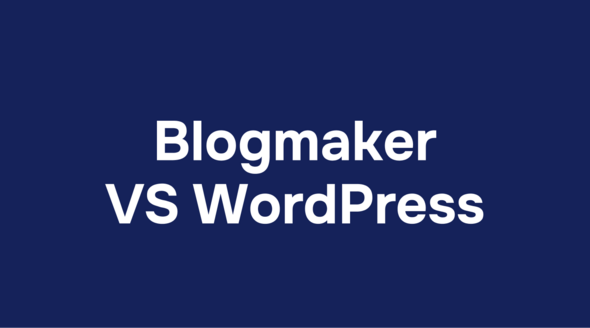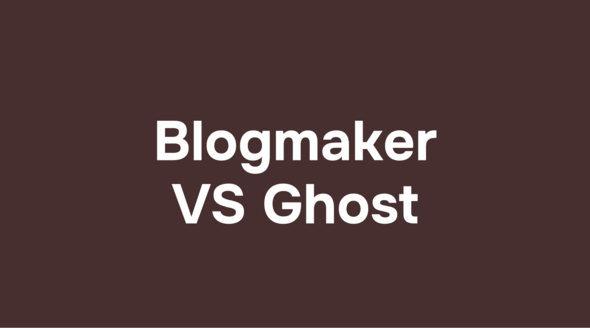Summary:
Choosing the best SEO blog platform involves evaluating various criteria such as speed, server-side rendering, on-site SEO options, content structure, and mobile responsiveness. A platform like BlogMaker stands out by offering these features out of the box, ensuring optimal performance and ease of use for SEO purposes. This makes BlogMaker a compelling choice for those seeking a dedicated SEO blogging solution.
Searching for the best SEO blog platform may not look an easy thing to do nowadays, with so many platforms claiming to be "the best", which at times it's true, but they try to be "the best" in many domains and fail to be great at one. And that's where BlogMaker comes in, but before we go into that, let's first talk about the criteria that make a platform great for SEO purposes.
Speed: In order for search engines to mark a piece of content credible, the blog serving that content needs to be fast. A platform that focuses on performance helps pages load instantly and keeps visitors engaged, which directly affects SEO rankings.
Server side rendering: In recent years, client side rendering has proliferated the web. This sort of rendering is not always reliable, because the end user may have their JavaScript disabled and if they visit such a blog, the content will not render. Server side rendering (SSR) ensures that the content is coming straight out of the database without any frontend engineering.
On–site SEO options: Schema, meta tags, and social media cards are just a few things that a “best SEO blog platform” must allow. Having access to these controls lets you tailor how search engines and social platforms interpret your content, improving visibility and shareability.
Content structure: A great SEO platform should let you organize posts with clear headings, categories, and tags so both readers and search engines can easily navigate and understand the hierarchy of your content.
Custom URLs: The ability to customize post URLs helps you include relevant keywords and keep links clean and readable, improving both user trust and search rankings.
Image optimization: Optimized images play a key role in SEO. Platforms that handle automatic compression, lazy loading, and alt text generation ensure faster load times and better accessibility.
Internal linking: Easy internal linking between related posts builds a strong content network, which helps search engines understand the relationship between pages and distributes link equity across your blog.
Canonical tags: To prevent duplicate content issues, a proper blogging platform should support canonical URLs, ensuring that search engines always index the preferred version of a page.
XML sitemap generation: Search engines rely on sitemaps to crawl and index pages effectively. A good SEO platform automatically creates and updates an XML sitemap whenever new content is published.
Mobile responsiveness: Since Google prioritizes mobile-first indexing, it’s crucial for your blog to look and perform flawlessly on smartphones and tablets.
Flexible content organization: The platform should let you create posts and standalone pages, group articles into multiple categories, and even schedule publications. This flexibility allows you to plan content calendars and maintain consistency, which helps SEO over time.
Full meta and social control: Every post should give you the power to customize its meta title, description, canonical URL, and how it appears when shared on social media. These small details can have a big impact on CTR and keyword performance.
Automatic sitemap and RSS feed: An SEO-friendly blog platform updates your sitemap and RSS feed automatically, ensuring search engines and subscribers always have the latest version of your content.
Custom domain and subdirectory support: Hosting your blog under your main domain or in a subdirectory is key for SEO because all the authority from your primary site flows to your blog.
Advanced crawl control: The ability to edit robots.txt and inject custom header or footer code gives you full control over what gets indexed, allowing for fine-tuned SEO strategies.
Ownership and export readiness: Your content should remain yours at all times. The best platforms make it easy to export, embed, or connect your blog to other tools through APIs without restrictions.
Hosting and infrastructure: SEO performance starts with reliability. A fast, secure, SSL-enabled infrastructure with global optimization ensures your blog is always accessible, reducing downtime and maintaining trust with both users and search engines.
These are just a few criteria, for a tool to be considered the best SEO blog platform all the above-mentioned criteria must be taken into consideration.
There are so many platforms out there and things you need to wrangle if you go with any one of them: hosting, plugins, etc.
Below are some of the leading products, with BlogMaker taking center stage, not just because of its capabilities, but also because of its accessible pricing which democratizes publishing professional content online with a cost that's an afterthought.
BlogMaker
BlogMaker checks every box when it comes to writing SEO content.
BlogMaker is a modern blogging tool that helps users create their blog with ease and modify its settings to match their brand or existing websites. The feature set is everything you'd expect from an advanced blogging tool and more. One benefit of using BlogMaker is that it's as simple or advanced as you need it. Meaning that the dashboard and the editor is clean in essence, but it has a lot of extra tools for the advanced user.
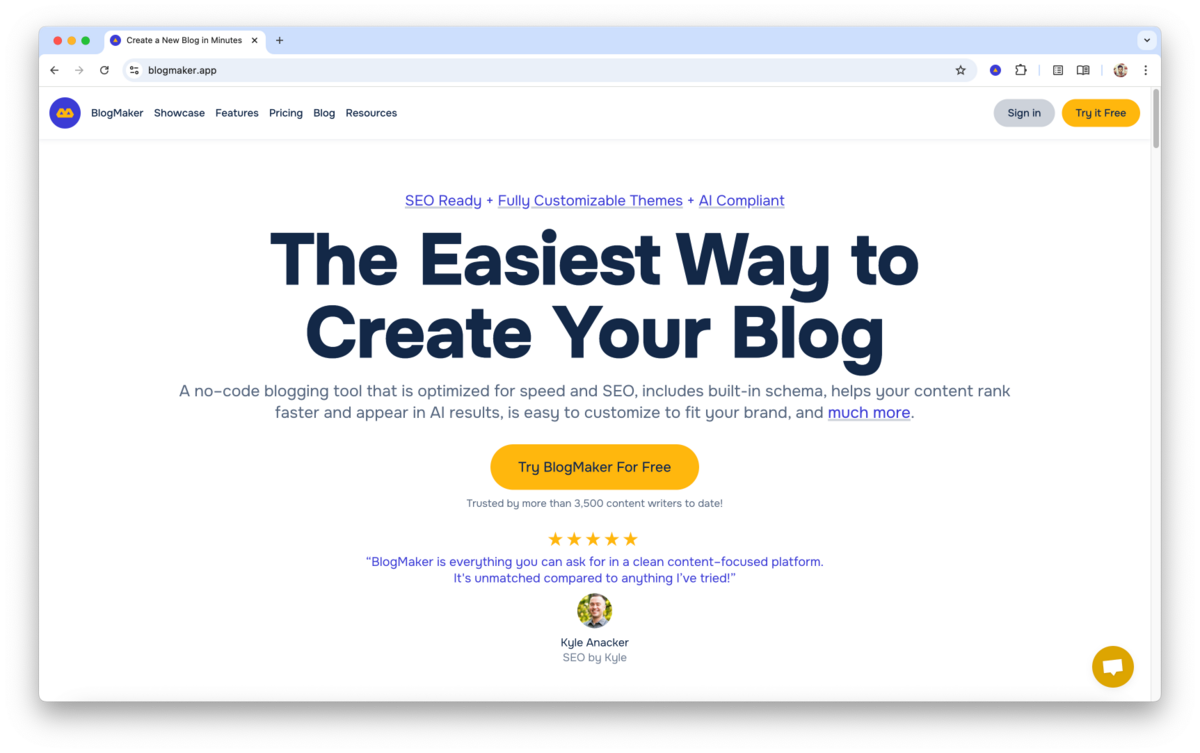
BlogMaker Reviews
Here are some BlogMaker reviews found in Trustpilot and Capterra.
"Stellar Product and Support" by Peggy Murrah
I am moving our blog over from WP, and every time I do something with BlogMaker (blogstatic), I love it more. This is a fantastic product, and customer support is stellar. Val (the founder) is always so helpful, even when the fault is entirely mine. Highly recommend.
"A Fantastic and Flexible Blogging Platform" by Enrique S
Super easy to set up and publish content. It’s also very easy to customize the theme to match your company’s look and feel, which is a big plus. The pricing is very affordable compared to other platforms. I also love the fact that you can integrate the blog into a directory instead of being limited to a subdomain.
"Surprised by quality, speed and user support" by David D
It's sooo easy to start with, infinitely easier than using WordPress and other blogging services I tried in the past. I have only been using it for a short time, but long enough to realize that everything in the service is well thought out, planned, and executed. I switched from WordPress and I do not plan to return. The best about BlogMaker (blogstatic): and incredible efficient and empathetic 5-stars customer support service!!!
"Exceptional Support" by Aissam Drai
I recently had an excellent experience with the support team at BlogMaker (blogstatic), and I felt compelled to share my thoughts. From the moment I reached out for assistance, I was impressed with their promptness and professionalism. I had encountered a technical issue while trying to customize my blog. After submitting a support ticket, I was pleasantly surprised to receive a response within just a few minutes. What stood out to me the most was their willingness to go the extra mile. They didn’t just solve my problem; they took the time to provide additional tips and resources to help me make the most of my BlogMaker (blogstatic) experience.
"Great product, greater customer support" by Ali F
Very easy to use, best customer support ever, minimalist to the core. The best word processor ever. Overall, it's a writer's dream.
BlogMaker Pros
- Hosted: You don't have to worry about downloading anything
- /subdirectory hosting: Run your blog on the /subdirectory of your main domain
- Highly customizable: You can modify existing themes to match your brand via their DesignStudio
- SEO–ready: Use every on–site SEO tool, including schema.
- Integrated analytics: You can use your own or rely on privacy–first built–in analytics
BlogMaker Cons
- Not self–hosted: You cannot host it on your servers
- No free tier: BlogMaker is a paid product
- No self–imports: They have to be done through the BlogMaker team
BlogMaker Generous and Simple Pricing
BlogMaker offers three clear simple and generous yearly pricing plans designed for different levels of users.
- The Starter Plan costs $19/year and includes one blog, one author, a free subdomain, domain connection, unlimited posts and pages, a dedicated SSL certificate, and access to DesignStudio for theme customization.
- The Expert Plan is the best seller at $39/year and offers every BlogMaker feature needed to run a successful blog. Also, it allows creating up to 3 blogs with 1 author each.
- The Business Plan is priced at $79/year and is geared towards teams with multiple authors. In addition it offers access to custom webhooks which you can use in your build.
Again, BlogMaker's simple yearly pricing makes it a favorite across the board compared to all other blogging tools.
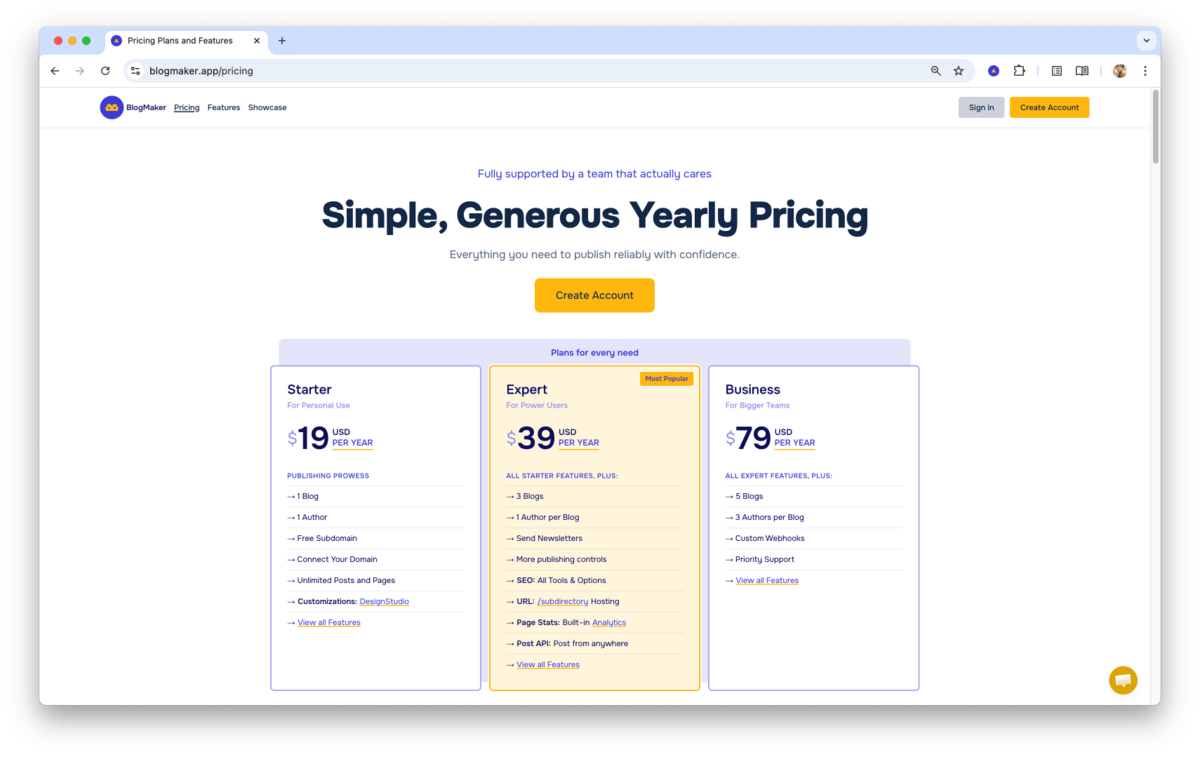
Blogger
Even though you can use Blogger to write SEO content, you don't have the ability to control the majority of aspects that make a piece of content truly SEO worthy.
Blogger enables users to publish blog posts online. Creating a blog on Blogger is completely free, but it lacks some of the features that can further help personalize a blog.
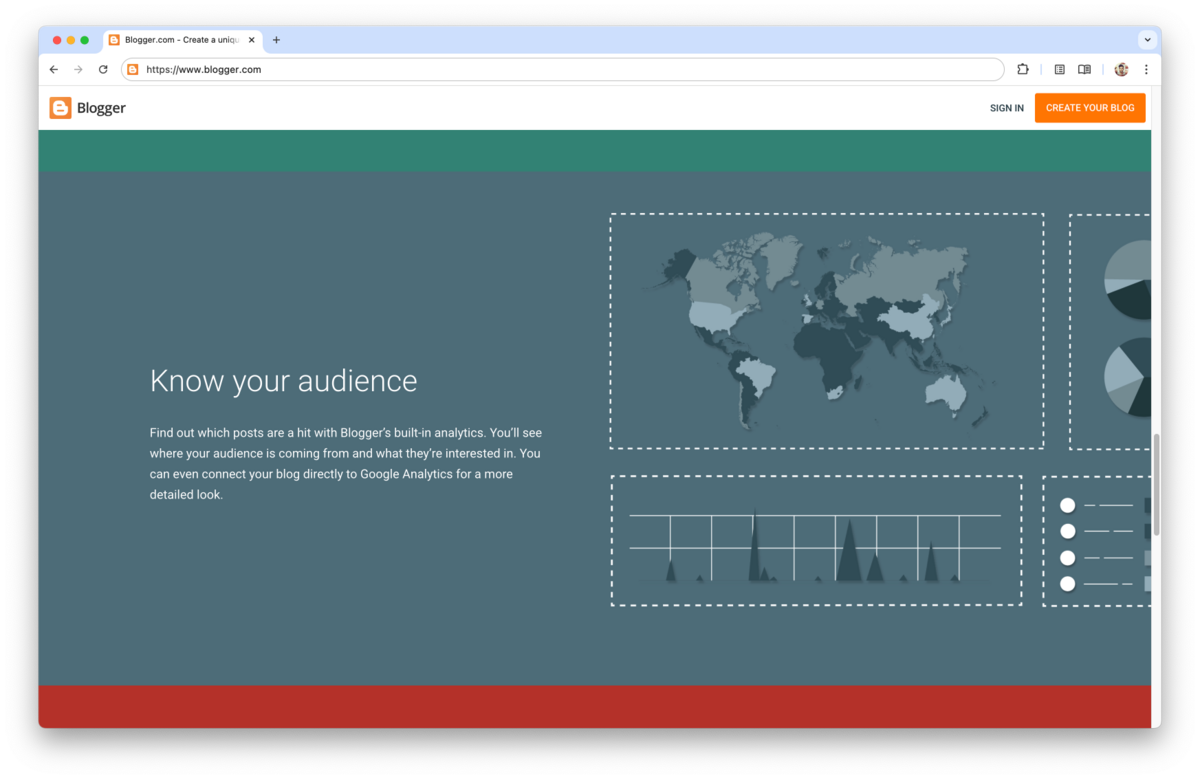
Blogger Pros
- Free: You can create a free blog.
- Analytics: Google Analytics are automatically connected to your blog.
- Simple interface: The editor is easy to use for a beginner.
Blogger Cons
- Limited customizations: You can edit HTML and CSS but options are restrictive.
- Outdated: Blogger lacks advanced features for anyone wanting to do more with their blog.
- Owned by Google: Google is known for shutting down products, which poses a risk for anyone running a blog in Blogger.
Blogger Pricing
Blogger is used by individuals who want a very basic blogging tool that doesn't include any of the features you would find in more advanced blogging platforms like BlogMaker, as such publishing with Blogger is free, which means you can set up your blog and start posting without having to pay.
Medium
The downside of Medium, regardless of its wide popularity, is that its a closed platform without many customization options,
Medium is an online publishing platform and social journalism outlet that caters to writers and readers alike, and it provides content discovery via its algorithmic feeds. Creating your blog on Medium is completely free, and you can connect your Medium page to your subdomain (example: blog.mydomain.com).
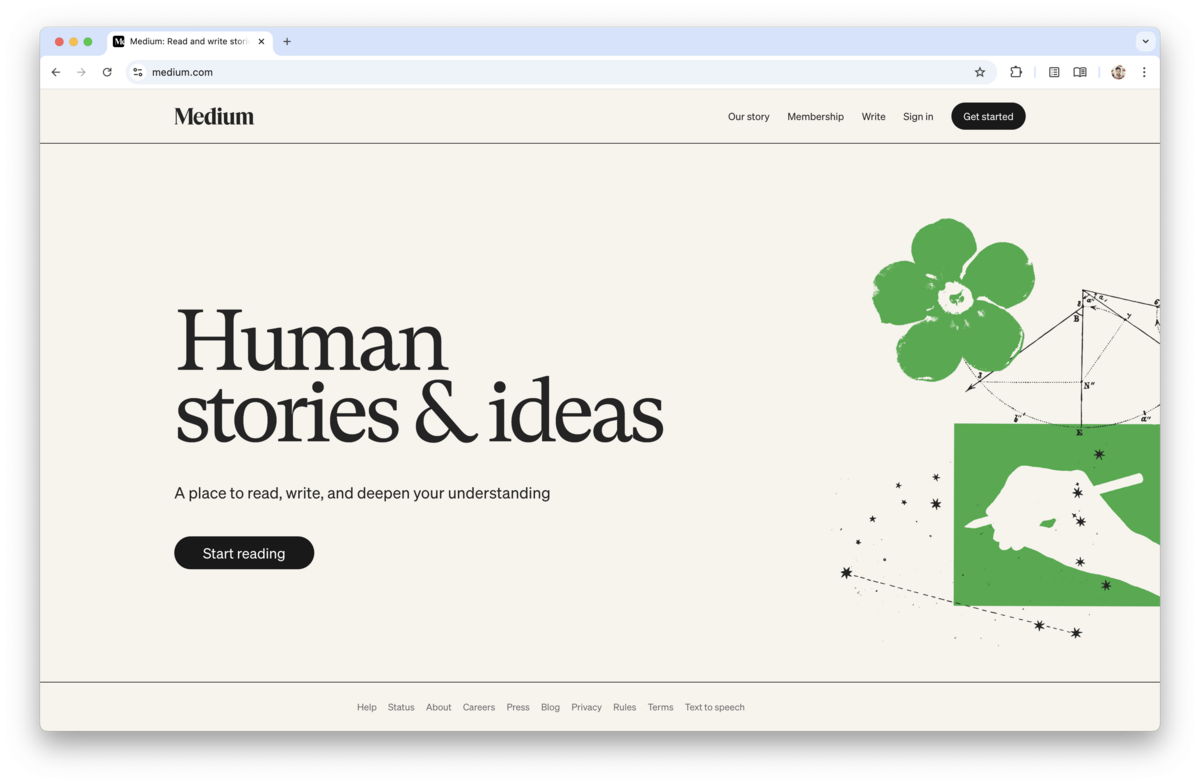
Medium Pros
- Discoverability (for Partner Program members): Medium helps with recommending and promoting your posts, but only if you are part of their Partner Program. Otherwise, reach and discoverability are limited.
- Low barrier to entry: You can start publishing right away.
- No maintenance: Your blog is hosted on Medium and you don't need to run any periodical maintenance.
Medium Cons
- Limited SEO: The lack of control doesn't offer a wide range of options for optimizing your content for search engines.
- Limited customizations: Medium maintains its own brand throughout the platform, and as such, any customization of your page is highly limited.
- Subdomain only: Medium doesn't allow you to connect your page to your root domain or a /subdirectory.
Medium Pricing
On Medium, writers pay nothing to publish their content. Only readers do.
You can publish your content on Medium completely free and connect your Medium page to your own subdomain only. You cannot connect your Medium page to your root domain or to the /subdirectory of your website, something that is easily done in BlogMaker.
The prices below are for readers only, and here's a little caveat: on Medium, your posts live inside their ecosystem. If you join their Partner Program, your posts automatically go behind a paywall (though you can choose to make some free), and then Medium decides which of your posts to promote and recommend. If you don't join their Partner Program, your posts are not promoted as much and won't appear in recommended articles.
On the other hand, for readers who decide to pay the monthly fee, they get many benefits, such as reading member-only stories, supporting writers, and listening to audio narrations (when available).
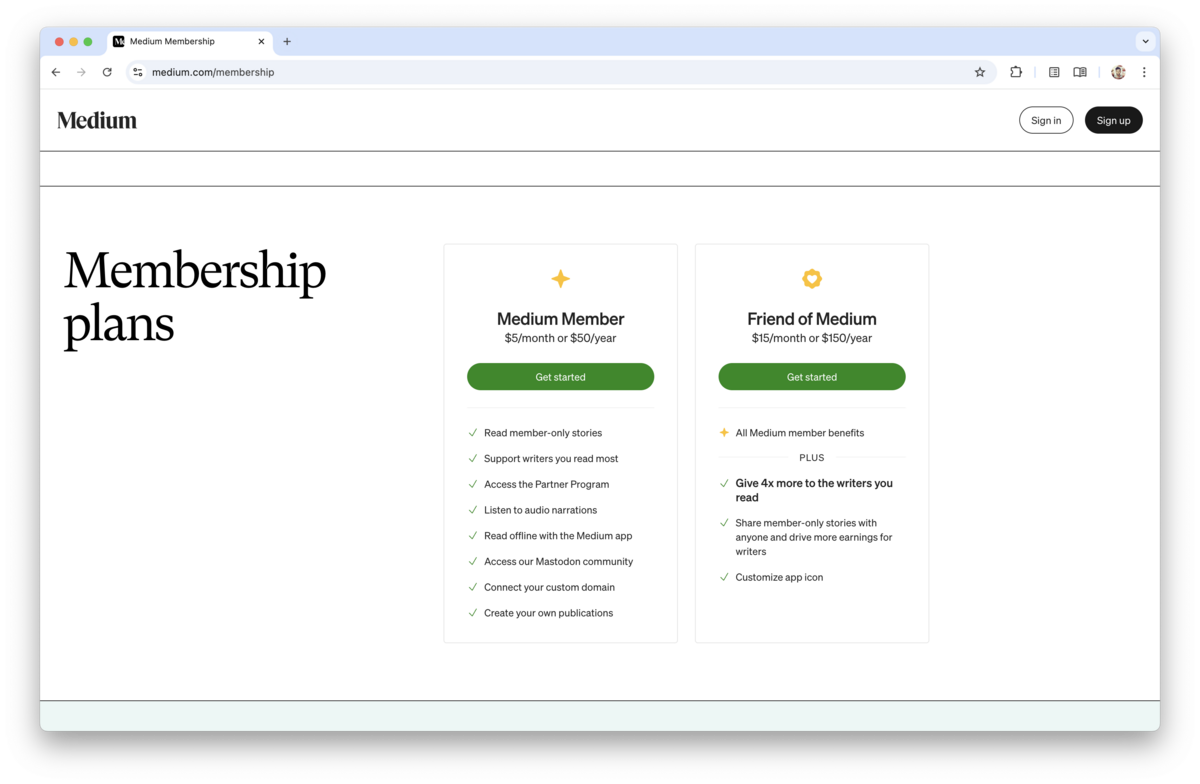
WordPress
WordPress is the behemoth. The 500-pound gorilla. However, over the years it has gotten bloated and hard to manage, without having to deal with plugins and add–ons.
With BlogMakeryou get everything out of the box.
Back in 2003, WordPress started out as a simple blogging tool. Over the years it has evolved into a website builder, a CMS, and a publishing tool for bigger outlets. WordPress has an extensive library of plugins and extensions that serve various purposes when publishing.
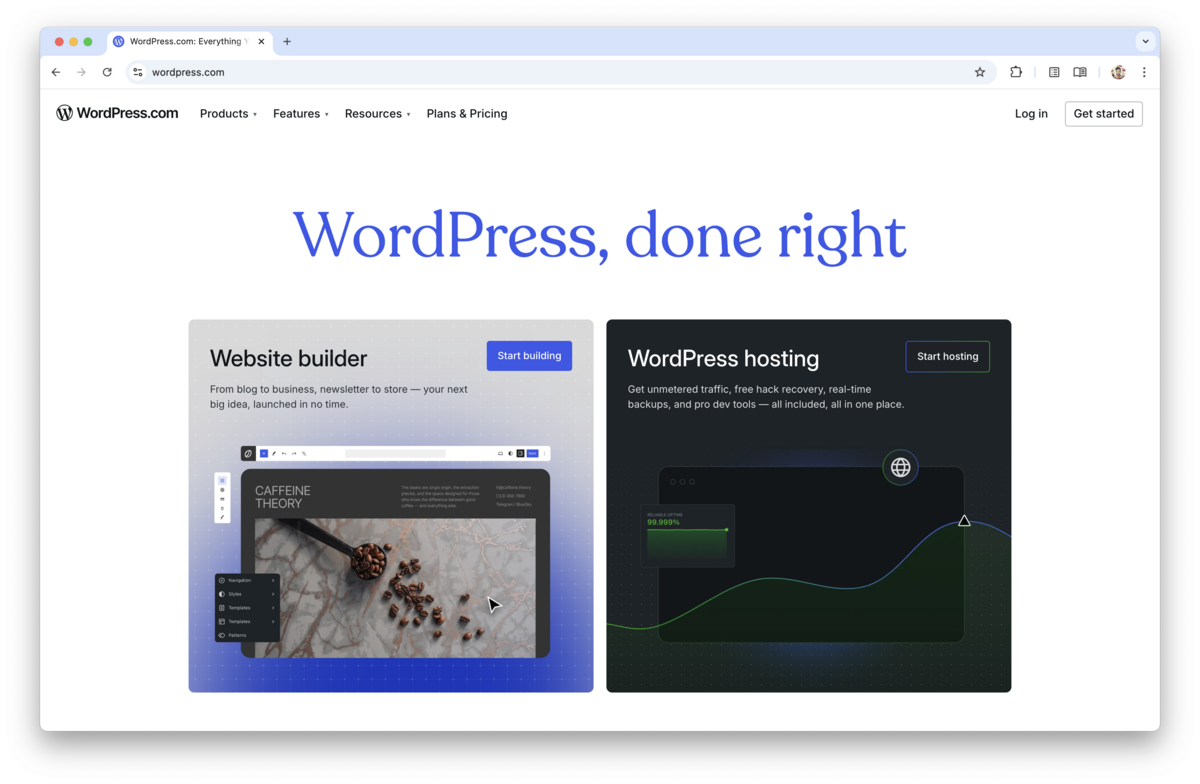
WordPress Pros
- Extensions and plugins ecosystem: WordPress has thousands of add–ons that can extend your build.
- Customizations and control: You can customize existing themes by adding your own HTML, CSS, or JavaScript, which require technical skills.
- Community: WordPress supports a large ecosystem of online tutorials and courses that are helpful for someone wanting to dive deep.
WordPress Cons
- Maintenance: Too many plugins can overburden the site and open it up to various security loopholes.
- Security risks: Because WordPress is so popular, it is also a frequent target for attacks.
- Performance overhead: The overall "heaviness" of WordPress can slow down the performance of your site.
WordPress Pricing
WordPress offers various pricing options starting from $9/month and all the way to $70/month. If paid yearly, prices are cheaper, but you have to pay the entire year upfront. Each plan comes with their own limitations and only the Business plan ($40/month) and above allow installing any plugins, including SEO tools. The initial plans, Personal $9/month and Premium $18/month, do not offer anything more than the basics.
Most of the features and benefits are not clearly spelled out in their Pricing page and only experienced once the user hits those limitations and is presented with the option to upgrade.
On the other hand, BlogMaker offers tools right out of the box without the need to install plugins that are hard to maintain and most of the time expose the website and blog to vulnerabilities.
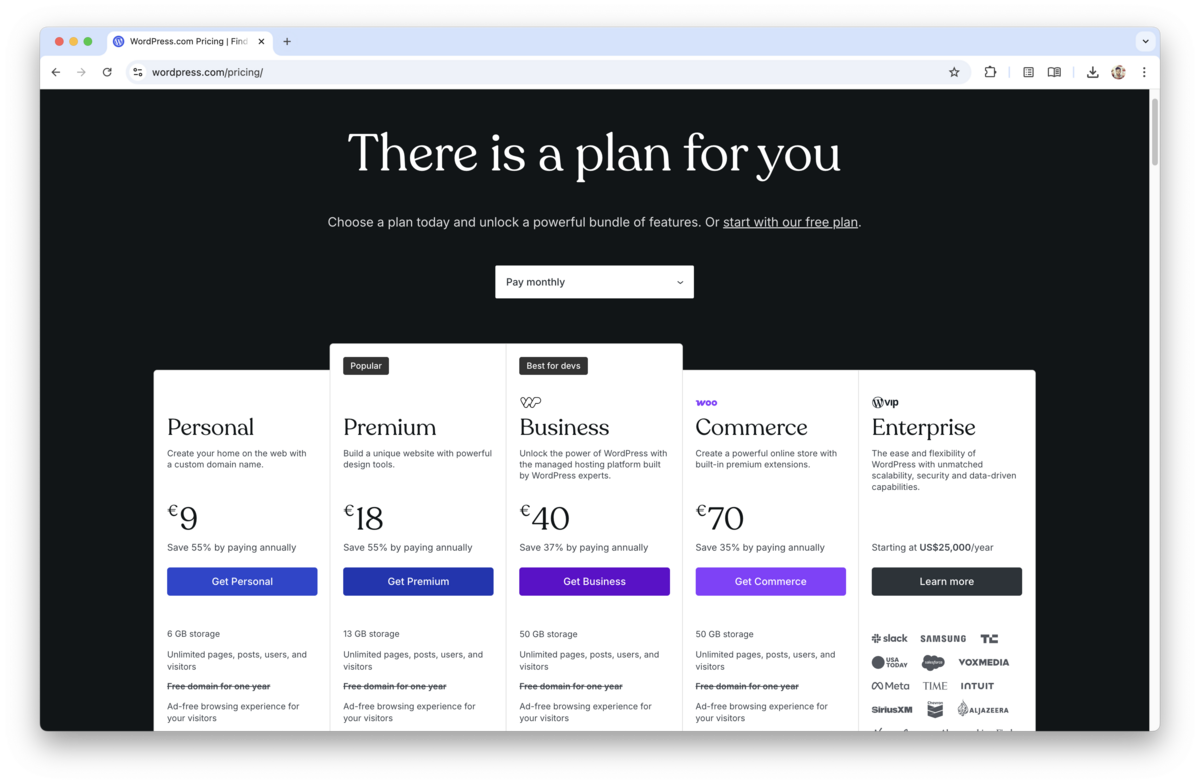
Wix
Wix is more of a website builder, however it does offer ways to write SEO content, albeit with limited options.
Wix in its essence is a website builder with e–commerce capabilities, however some use it for blogging as well. Even though it doesn't have dedicated SEO controls, it can pass as an add–on to an existing shopping website.
With that said, it does offer some options in terms of SEO controls, like

Wix Pros
- Drag and drop interface: You can customize your blog, but may feel overwhelming.
- Integrated features: It comes with a newsletter and an analytics tool.
- Free to run a simple blog: It's free to run a simple blog, but it will show ads from the Wix network.
Wix Cons
- Locked–in ecosystem: Hard to export your content and move it elsewhere.
- Speed: It has performance issues and pages can feel slower.
- No /subdirectory hosting: You cannot run your blog on the /subdirectory of your domain, which is crucial for SEO purposes and something that is easily available in blogging platforms like BlogMaker.
Wix Pricing
Wix pricing caters mostly to eCommerce websites with clear limitations on usage as well as features.
Their current plans are:
- Light: $17/month
- Core: $29/month
- Business: $39/month
- Business Elite: $159/month
With that said, their focus is on the Business Elite plan, which has all the features.
Again, it's worth mentioning that the /subdirectory option in Wix is non–existent
In contrast, the /subdirectory option in BlogMaker is offered in the Business Plan at no additional expense.

Squarespace
Squarespace is another website builder, that offers some SEO options, but of course it lacks the capabilities of BlogMaker.
Squarespace is a website builder that also doubles as a blogging tool, even though the company's focus is in e–commerce focused websites. For someone wanting to publish occasionally without the benefit of features found in advanced blogging tools, Squarespace is the right choice.

Squarespace Pros
- Templates: Squarespace is known for their sleek templates, even if not fully focused on blogging.
- Integrated features: Analytics and forms are included.
- Hosting: There's nothing to install no need to worry about purchasing hosting.
Squarespace Cons
- Clunky editor: The editor feels like a page builder and not an actual editor.
- Lack of SEO options: Squarespace lacks SEO controls that professional bloggers need.
- No /subdirectory: In Squarespace you cannot run your blog under the /subdirectory of your root domain, something you can do easily in advanced blogging platforms like BlogMaker.
Squarespace Pricing
Squarespace offers four pricing plans, that can be paid in both monthly and yearly installments.
The "Personal" plan offers the basics, with only the last tier at $72/month offering the entire package.
The advanced plans in Squarespace are more geared toward payments, invoices, and merchandising for e–commerce websites.
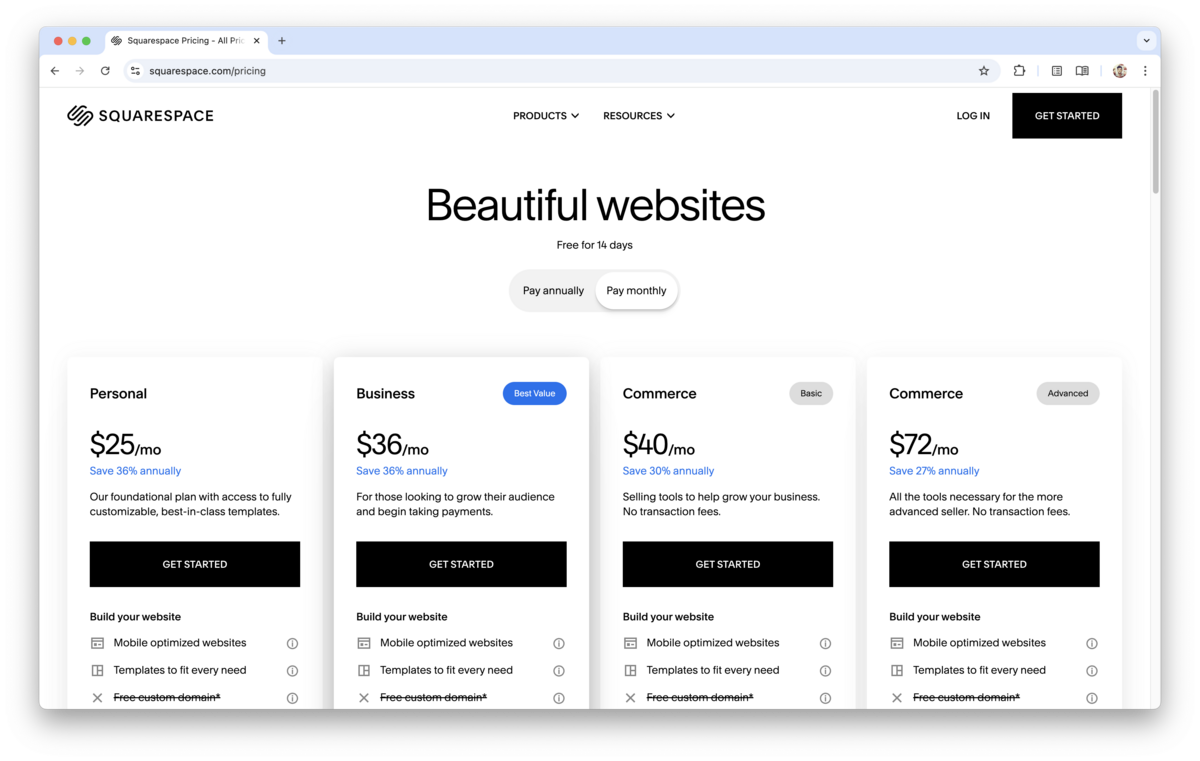
Ghost
Ghost is a real contender, however they are now more tailored towards the Substack writers and for building audiences, not so much focused on the SEO part of things. Not to mention their higher pricing of all. Unlike BlogMaker, which makes paying for it an afterthought.
Ghost is an online publishing tool that started as a blogging tool and a WordPress alternative, and then grew into a publishing platform used by both writers and small to mid-sized outlets. Also, it caters to individuals who write newsletters and seek to grow their audience. Something akin to Substack.

Ghost Pros
- Open source: You can download, install it, and run it entirely on your own by hosting it on your servers.
- SEO by default: Ghost is optimized to run fast and provide all on–site SEO options.
- Writing simplicity: Their editor aims to be distraction–free so you can focus on your writing.
Ghost Cons
- Lack of design customizations: If you want to fine–tune your selected theme in Ghost, you would need to add your own HTML, CSS, and sometimes JavaScript. Ghost doesn't have something like DesignStudio, however you can alter elements like logo, some colors, navigation, etc.
- Lack of plugins and extensions: Ghost's ecosystem is limited in extending it with plugins and other add–ons, especially since they offer an open source version.
- Demanding technical setup: If you decide to host Ghost on your own, there is a considerable amount of maintenance associated with it.
Ghost Pricing
Ghost offers three basic pricing tiers and a Custom one which is offered in 1–3 year terms, and it's geared towards complex use cases, such as online news outlets.
Their front–facing subscription plans are Starter, Publisher, and Business.
It's worth mentioning that the /subdirectory option in Ghost is available only through their Business Plan at $239/month and enabling this feature typically incurs an additional setup cost of around $50/month.
In contrast, the /subdirectory option in BlogMaker is offered at the $29/month plan, at no additional expense.
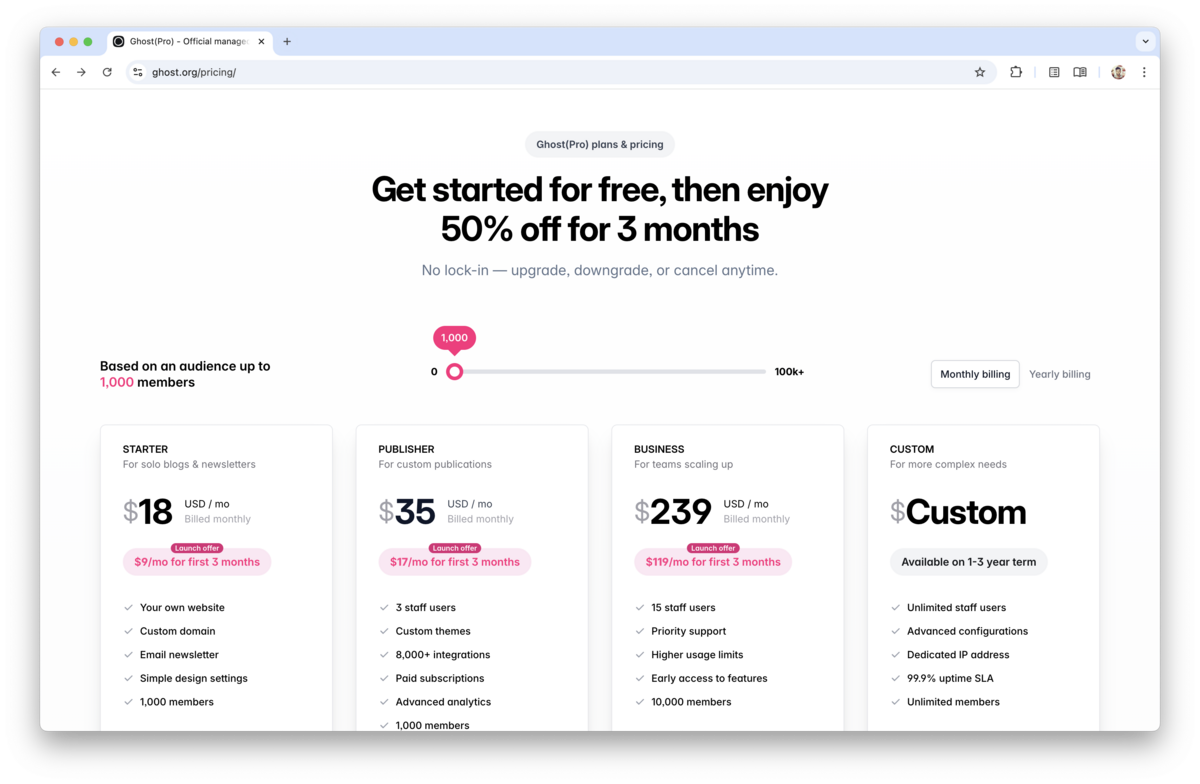
Substack
Substack has gone the way of Twitter, with feeds and content that's paywalled. It could be a free alternative to writing SEO content, but its options are limited and migrating the content later on to a dedicated SEO driven blogging platform, like BlogMaker, could be a nightmare.
Substack initially launched as a newsletter platform. Recently it has evolved into a publishing platform that caters to writers in social and political discord, but not so much to the professional content writers looking for an SEO–ready blogging platform.
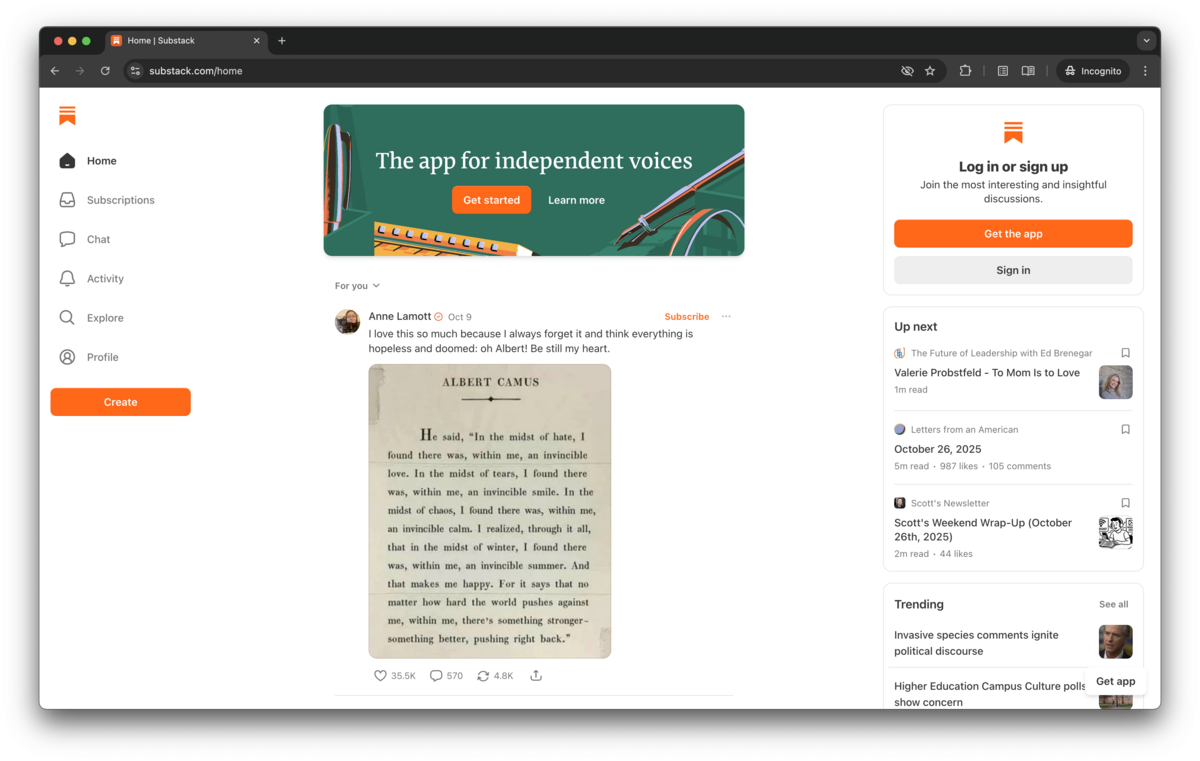
Substack Pros
- Open source: You can download, install it, and run it entirely on your own by hosting it on your servers.
- SEO by default: Ghost is optimized to run fast and provide all on–site SEO options.
- Writing simplicity: Their editor aims to be distraction–free so you can focus on your writing.
Substack Cons
- Limited SEO controls: Non existing SEO tools and controls.
- No /subdirectory hosting: Substack doesn't allow to host your content on the /subdirectory of your root domain, which is crucial for SEO purposes.
- Ecosystem dependency: You rely on Substack's whims and change of direction. Moving away from it doesn't carry over the "SEO juice" you have built over the course of using Substack.
Substack Pricing
To publish your thoughts on Substack is free, but you can choose to monetize your writing by setting your prices. From every transaction you generate Stripe takes a flat 10% fee and you also incur Stripe fees starting at 2.9% and 30¢ per transaction.
In other words, if you charge your client $10/month for having access to your content, Substack will take $1 from that transaction and Stripe will take 59¢. Sometimes there are other fees included with each individual Stripe transaction, which you can find on the Stripe Pricing page.
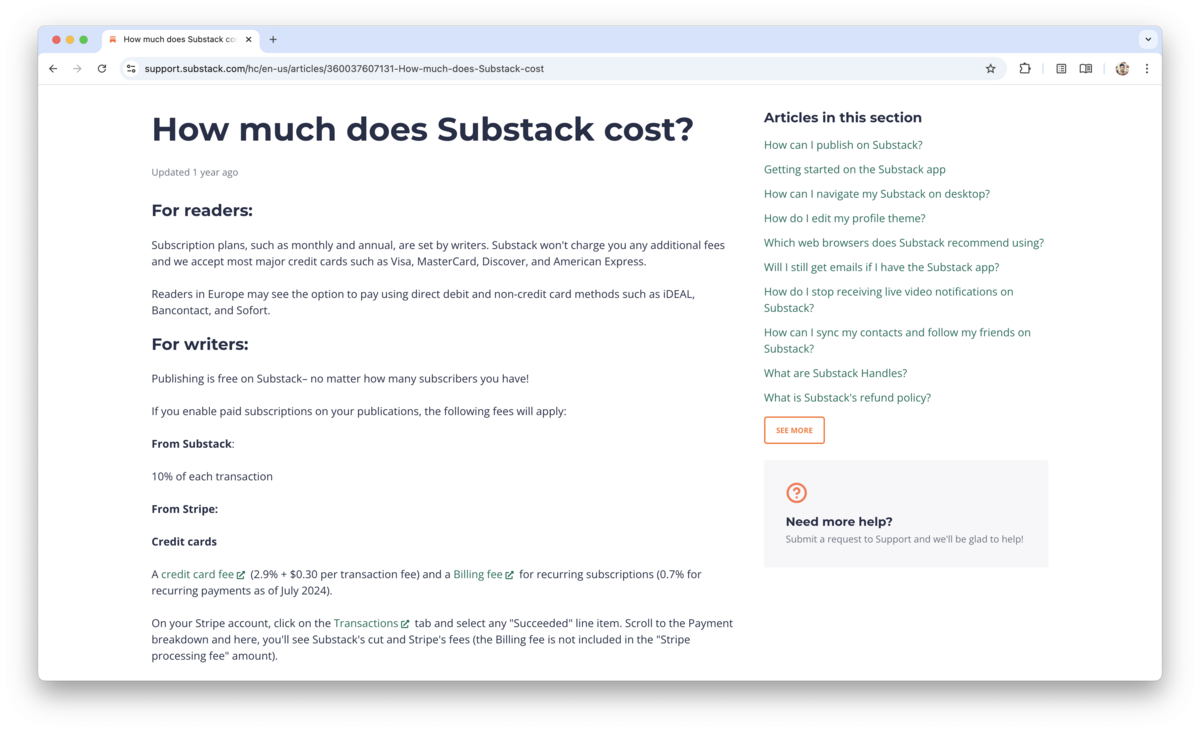
Carrd
Not an SEO tool by any stretch, but Carrd is a one page website builder that is super versatile for building landing pages, which can be easily extended with BlogMaker for the SEO side of things.
Selecting a tool for your blogging needs is a crucial decision because moving platforms later on can be cumbersome, and you want to choose the one that fits you best, both in how it’s used (your personal preferences, workflow, likes) and how it performs toward your goals. Below is a list of criteria that can help you decide: Ease of use: When writing, you want a tool that’s distraction free on the surface yet robust enough in the background to provide all the necessary features to get the job done. Speed: Search engines reward blogs that serve content fast. You want a blogging tool that helps visitors quickly navigate from post to post. If your blog is too slow, they will bounce quickly. SEO tools: On-site SEO customizations go a long way when running a blog aimed at search engines. Make sure your blogging tool allows for metadata customization, includes schema markup, provides a sitemap, and serves pages that search engine bots can easily crawl and index. Features: A robust blogging tool offers essential features for daily use as well as advanced ones that help you level up your blog. These advanced features can range from creating dynamic tables of contents to adding footnotes, galleries, and more. Technical aspects: Other features such as code injections, API calls, or translations help you make a hosted blog truly your own. Ideally, a no-code blogging platform should feel as if you built it yourself. Custom domain: Running your blog on your root domain (domain.com), subdomain (blog.domain.com), or a /subdirectory (domain.com/blog) is crucial for owning your content and ensuring that any SEO equity flows to your main domain. Aesthetics: The way the dashboard and its themes are designed greatly affects how you feel when using a blogging platform. Customizations: A blogging tool that allows you to fully customize both technical elements (menus, links, preferences) and visual ones (colors, fonts) gives you a sense of ownership and ensures consistency with your brand. Newsletter: Most blogging tools do not include a built-in newsletter, but those that do truly think about their users. While there are many standalone newsletter tools, you do not want another layer of maintenance or extra subscription fees on top of running a blog. Collaboration tools: If you write with other authors or hire editors, being able to give them limited access so they can write their own content without seeing others’ is a big plus. This way you can operate with multiple contributors without compromising security or the safety of your blog. Analytics: Being able to insert a Google Analytics code (if code injections are supported) is useful, but blogging tools with built-in analytics go a long way in removing yet another task from your plate. No-code: As a writer and content creator, you want a blogging tool that just works. You do not want to build something from scratch and then deal with maintenance. Choose a tool that is easily customizable through drop-downs, color pickers, font selectors, and text areas for quick input. Support: Choose a company that genuinely cares about its users and goes above and beyond to help them succeed. Large companies often rely on canned replies or AI-driven chat widgets that lack true empathy. Look for a blogging platform run by real humans who care about your success.
Things to look for in a blogging tool
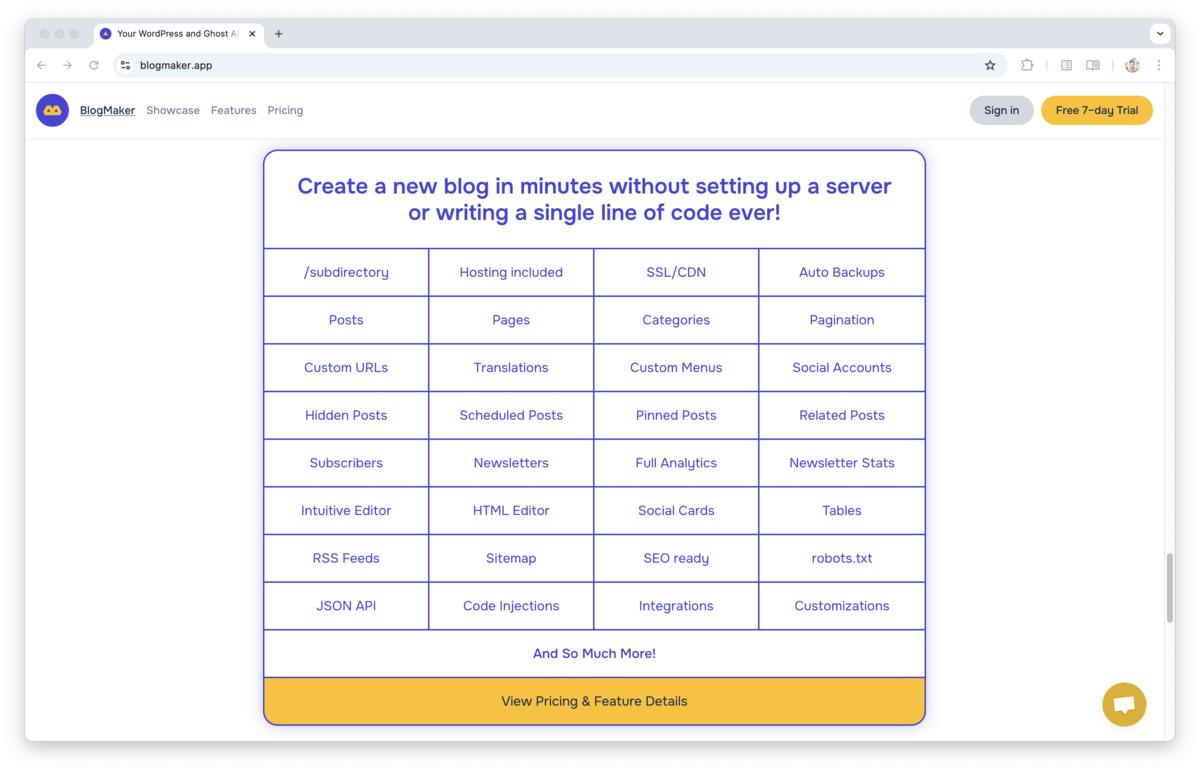
Final Thoughts
For a product that covers all the criteria from above, and more, check out BlogMaker.
BlogMaker's feature set and pricing is unmatched. The Expert Plan covers everything you need in a blogging tool, including the /subdirectory hosting, without any extra fees.
In addition you can easily customize any of the existing themes via the DesignStudio section.
Angela F —
"I am moving our blog over from WP, and every time I do something with blogstatic, I love it more. This is a fantastic product, and customer support is stellar. Val is always so helpful, even when the fault is entirely mine. Highly recommend."
Create your new blog




